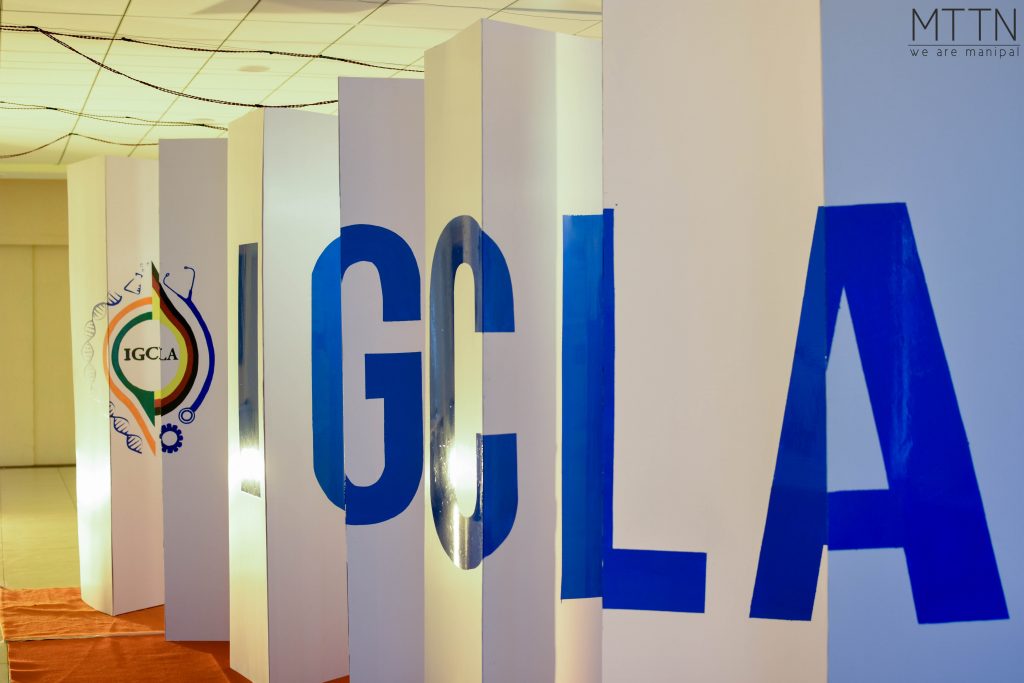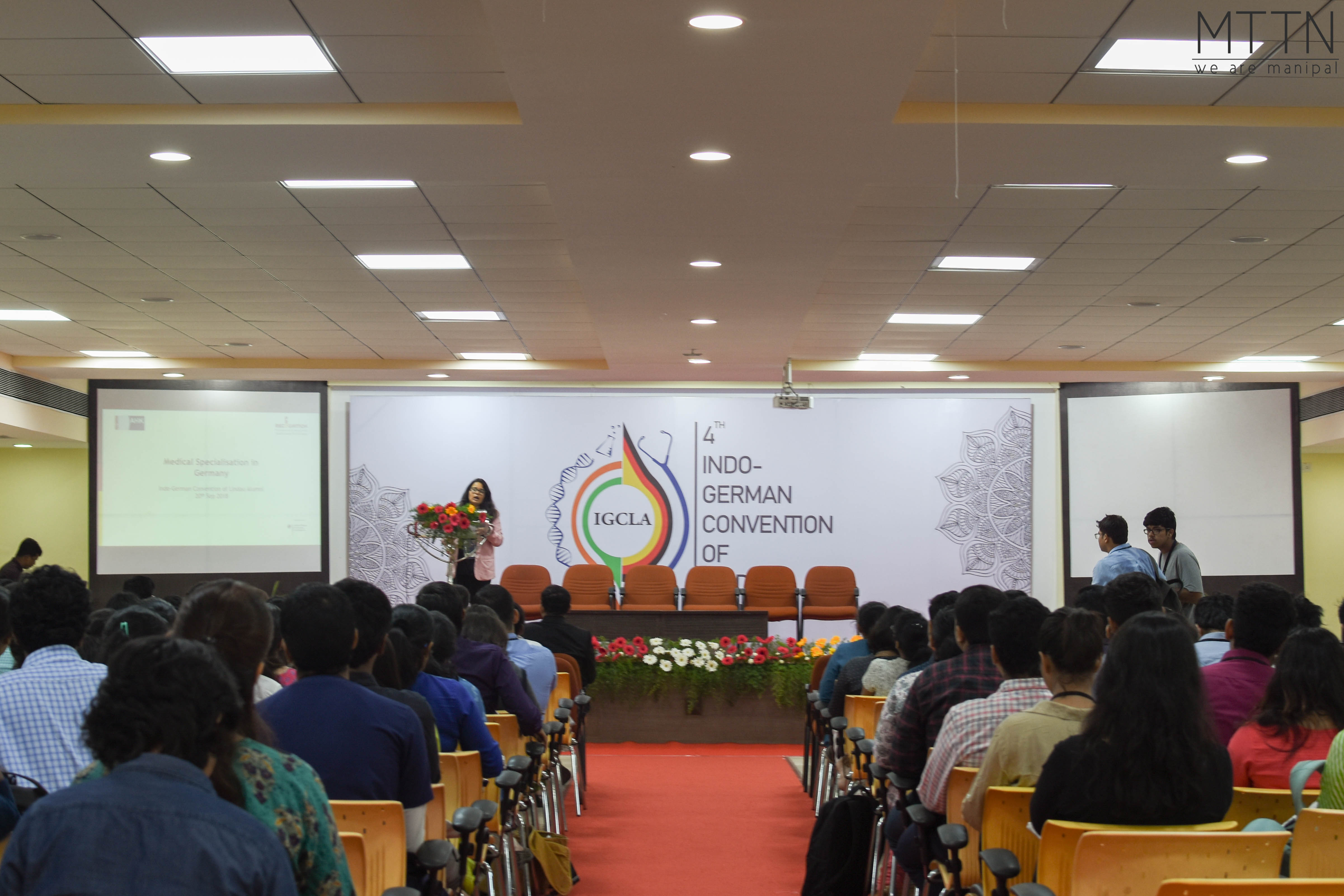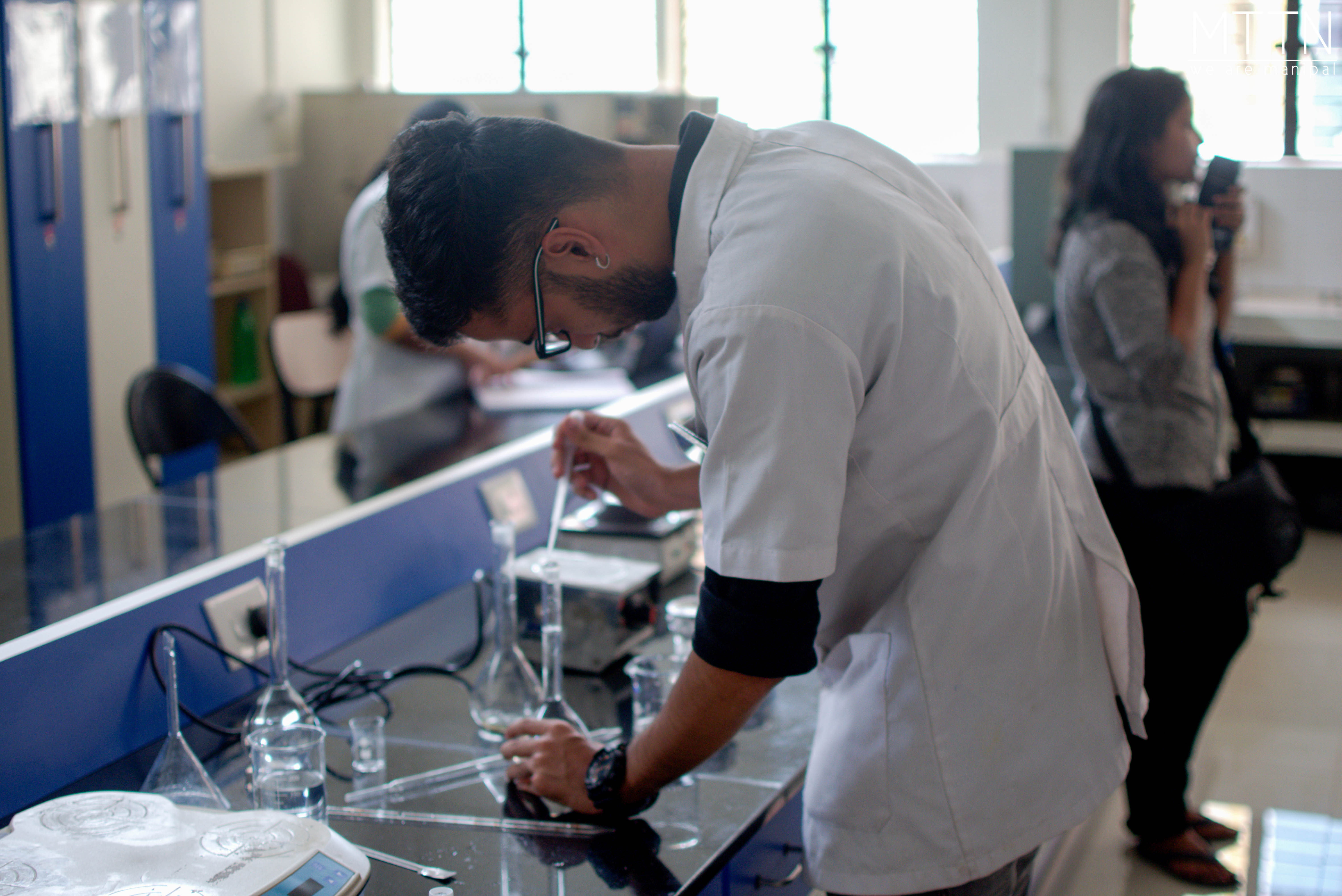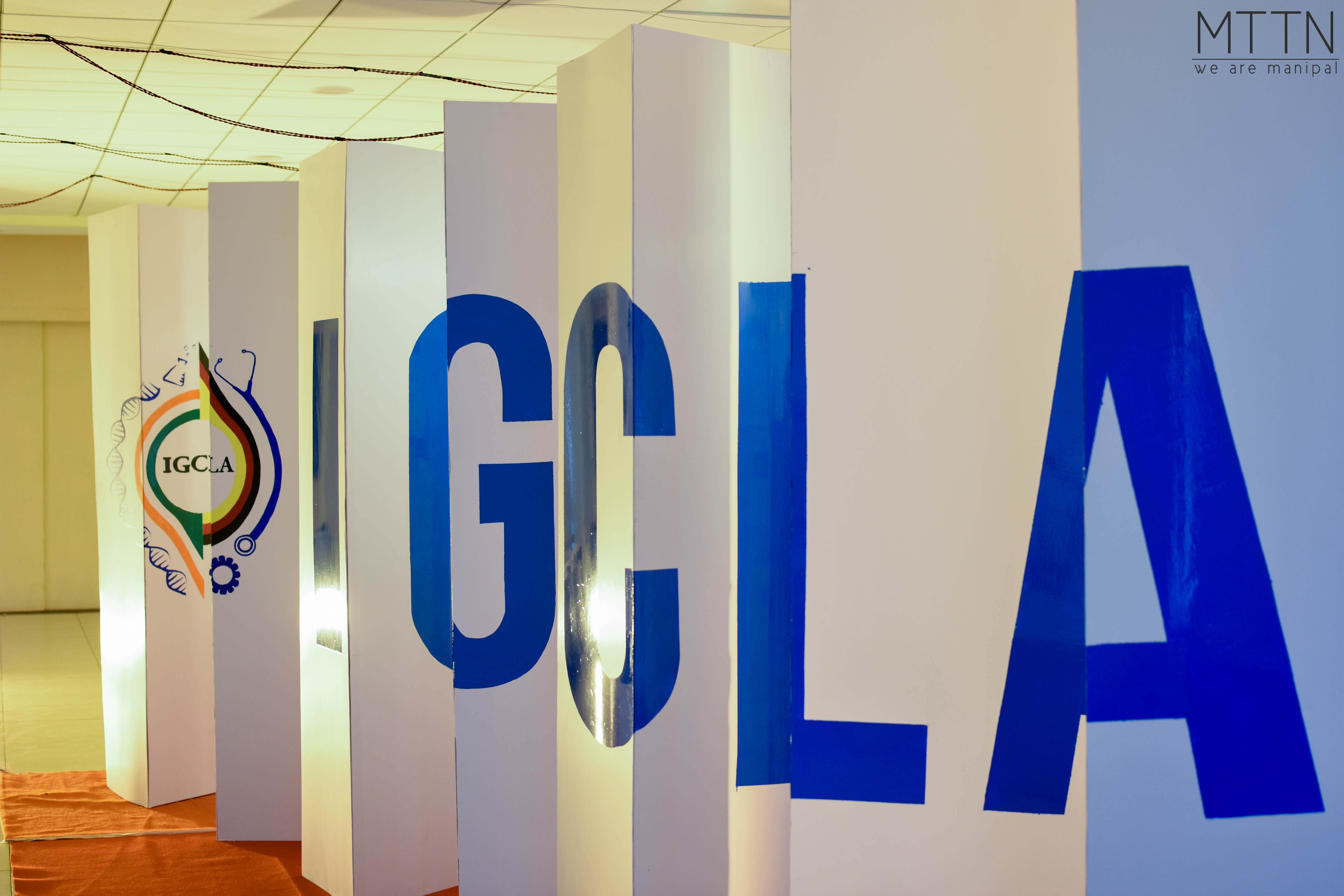
Prorecognition and inauguration: Curiosity is the true religion of a student. It is this craving for knowledge that unites us all as one community in pursuit of the infinite. The Indo German Convention of Lindau Alumni is one such celebration that nurtures and fuels this spirit of universal learning. Various achievers from across the country adorn the dais of IGCLA for three days and share their stories to help create an impact on the minds of the future thereby fulfilling their responsibility towards the community that incubates them.
The pro recognition event consisted of a panel of three delegates, Dr. Partha Dabke, Dr. Amrit Roy, Ms. Isabelle, and Dr. Anibh Das. They raised some preliminary concerns regarding interested applicants for German residencies. They spoke about the German style of presentation, from a basic CV to an interview at a reputable institution. They briefed the audience about the process of application and various hurdles that one must cross before getting a chance to indulge in the German experience of medicine and science.
The Inauguration Ceremony: Following the Prorecognition was the inauguration ceremony which was presided over by the Honourable Chief guest Ms. Margrit Hellwig Botte who is the Consul General at the German Consulate in Bengaluru, Dr. Reena Nair who is the Secretary in-charge of the MCI, and the mammoths of MAHE Dr. HS Ballal, Dr. Vinod Bhat, Dr. PLNG Rao, Dr. Poornima Baliga and the Dean of KMC Manipal Dr. Pragna Rao.
The ceremony began with Dr. Pragna Rao’s welcome note which included the recent achievements of KMC and an insight into the convention’s goals. This was followed by a narration by Dr. Dabke about the conception and growth of IGCLA. Dr. Reena Nair spoke about the challenges faced by the MCI as the governing body of the Medical curriculum in such a huge and diverse nation. She spoke not just about the positives and the achievements of the MCI but also the backlogs and the bureaucracy that haunts the institution. However, she made an ardent effort to instill the ambition required for the pursuit of the Medical career.
The Chief guest Ms. Margret Hellwig Botte addressed the gathering with a special German charm reflecting both in her accent and innovative ideas. She heralded the Indian intellectual community as a global power that has made a significant impact on German soil. A huge compilation of facts that she collected from the consulate and produced at the ceremony bore testimony to this. She spoke for much more cooperation between India and Germany in the future and encouragement the audience to look toward rest of the west and not just the USA and UK. She even spoke about the magnanimity of Dr. TMA Pai’s vision and the debt that the world community owes to his pioneering personality.
Her speech was followed by a presidential address by Dr. HS Ballal, Pro-Chancellor of MAHE, who gave a brief narrative of MAHE and KMC’s achievements that have helped provide Manipal a global recognition. Dr. Vinod Bhat spoke of the IGCLA story from an administrator’s ‘healthy-affordable-homely’ point of view and appreciated Dr. Partha Dabke for setting such innovative goals for himself that help him give back to his Alma mater. Dr. Poornima Baliga, Pro-vice Chancellor of MAHE released the abstracts’ book of IGCLA and presented all the assembled dignitaries with a copy. Lastly, the ceremony concluded with the unveiling of the art-photography exhibition curated by Dr. Akhter Hussain, an orthodontist from Mangaluru under the theme of ‘visualizing art in sciences’.
After such a grand ceremony the vote of thanks was rendered by the organizing committee chairperson Ms. Apoorva which reflected the enormity of the gathering both in physical numbers and scholastic achievements.
Preventive and Personalized Approach for Hypertension Care to Diagnosing Thyroid Disorders (Presented by Dr. Varsha Singh)
With over 5 patents under her name, Dr. Varsha has taken part in various multi-disciplinary activities. She has also won several awards along with her team including the Gandhian Young Technological Innovation Award.
Dr. Varsha and her colleagues have come up with a tool for optimizing diagnosis, treatment, and prevention for a medical care delivery system in women and children in developing countries called HyTC ( Hypertension Care). It is essentially a personalized therapeutic approach to the prevention and management of Gestational Hypertension, Pre-eclampsia as well Chronic Hypertension. Dr.Varsha tackles the problems faced in places like India through a methodical system consisting of published evidence on clinical and cost-effectiveness of treatment strategies, health surveys to develop a personalized database, modeling web algorithms for personalized care plans, transferability assessment, data management plans such as health surveys/medical histories and finally evidence-based decision making. She plans to eradicate a single drug given to the masses and instead stresses on the need of input of a single drug to personalized combinatorial therapies by compiling a catalog of drugs, biomarkers and medical histories.
One of the latest developments by Dr. Varsha is a device called a Thyrometer which is a device to screen Thyroid Disorder based on the same concept on a Glucometer. It was patented in 2016 and has yet to be released as a prototype. It is a portable screening device that gives you immediate results while eradicating lab costs and transport costs as people in rural areas tend not to travel to urban areas and end up ignoring the symptoms. Normal thyroid tests require invasive procedures to draw high volumes of blood. Well, this device required about 10 microliters of blood.
Dr.Varsha aims to target 600,000 villages in order to prevent congenital hypothyroidism and last but not least to empower the women of rural India which are usually the most affected by thyroid related disorders.

Talk by Dr. George T. Joseph
As brilliant as he is accomplished, Dr. George T. Joseph spoke with passion and vigor about changing India’s infrastructure covering different aspects of the lifestyle of the people of India. He began his talk by showing one of the numerous litigations that he filed against the government of India, the Indian Railways as well as the Pollution Control Boards way back in 2006 to install bio-toilets to ensure proper and safe disposal of the fecal matter on trains. About 5 million people mainly infants die while 25 million people end up with serious illnesses due to improper waste management. Thanks to his valiant efforts, 80 percent of all trains running in India have been fitted with bio-toilets which have played a major role in reducing the mortality rates in India.
He drew parallels between countries of the world such as Japan, Germany, and the USA and astounded us with stark comparisons made between us and the world. While our streets are filthy from the garbage strewn around, places like Europe have efficient waste disposal systems in place. The dumping grounds in India are not only killing human life but animal life as well resulting in the destruction of our ecosystem while that of the USA seems to be flourishing. Recreational places such as parks mainly viewed as places of serenity are bustling and littered in India while Japanese gardens are the epitome of serenity and highlighting natural landscape invoking a deep appreciation for nature to anyone who spends time in it.
Last but not least, he honored and remembered the Pai Brothers as well as Kasturba Gandhi, the inspiration behind TMA Pai ’s idea to christen the name of the medical college as Kasturba Medical College.
Ketogenic Diet and Therapy Refractory Epilepsy: Do Sirtuins play a role? (Presented by Dr. Partha Dabke)
The IGCLA conferences have been known to showcase a multitude of doctors and scientist along with students with incredible ideas that have taken the scientific world by storm. Hence it was no surprise when Dr. Partha Dabke, an alumnus of Kasturba Medical University walked onto the stage to the sound of thunderous applause.
He spoke about how ketogenic diets are used to treat patients who do not respond to conventional epilepsy treatments. A ninety percent fat ketogenic diet is difficult but quite effective in treatment as compared to modified versions where the fat content is reduced and replaced with a liberal protein intake in order to ensure the required amount of calories are received no matter the source. As part of his Ph.D. project, Dr. Dabke is looking into a group of 7 enzymes called Sirtuins which play an important role in mediating the treatment for epilepsy. Sirtuins are responsible for running the basic functions of the human body such as metabolism, inflammation, and aging. However, these enzymes have also been implicated in cardiovascular disorders and tumors. The hypotheses that he proposes state that this pathway might be one of the pathways through which the Ketogenic diet may act as well as the neuroprotective effect of the Sirtuins may be due to changes in energy metabolism.
In certain energy deficient conditions our brains are affected due to the lack of Glut-1 transporter. This manifests in the form of epilepsy, mental retardation, and microcephaly. The diet in question can be used not only for therapy-refractory epilepsy but also Glucosetransporter deficiency, PDH-deficiency, Complex-I deficiency, and GSD III.
Workshops, Day 1: IGCLA Day 1 kicked off the workshops with an exciting start. The Dosage Engineering workshop was conducted by the Department of Pharmaceutics, Manipal College of Pharmaceutical Sciences. Dr. Usha Y Nayak, Associate Professor, along with Ms. Reema Narayan, Mr. Chetan Mehta and Mr. Akhil Suresh started the session with an informative presentation on tablet engineering. They explained the various types of dosage forms and the method of preparation of tablets. The delegates then got the opportunity to prepare Aspirin tablets from raw materials by direct compression method. They weighed and mixed the ingredients, and punched the tablets with the help of machinery. Each delegate made their own batch of tablets which were evaluated on various parameters such as hardness, friability, disintegration, and dissolution. The workshop was highly educational, interactive and was thoroughly enjoyed by the delegates.

Conducted by the Department of Pharmacology, KMC Manipal, came the next workshop which began with an educational presentation by the head of the department about animal safety, ethics, morality and the fine line between research and animal rights violations. The next part of the workshop took place in the lab. Anticipation tinged the air as the participants were faced with live mice and eager instructors. There were demonstrations of different routes of drug administration, testing drug response and more. Participants were allowed to hold the mice, apply the techniques they’d learned, follow up on in situations experiments and learn from those with immense experience in this field.
Lastly, came an interesting workshop called ‘3D printing and its medical applications’. Dr. Sampath Kumar, Associate Professor in the Department of Electronics and Communication-Manipal Institute of Technology, shed more light on the same. Having completed his B-tech in Electronics and Communication, M-tech and Ph.D. in Biomedical Image Processing, then Biomedical Imaging and Computer Vision, he went on to study about 3D printing. The workshop conducted enlightened the students about how 3D printers actually work in various fields be it medical and healthcare or industrial. Despite the fact that an actual 3D printer couldn’t be brought to the conference due to calibration issues, Dr. Kumar made it interesting by showing videos on how a 3D model is built in the x-y-z plane. He further spoke on how Tissue Engineering and Regenerative Medicine are the two most promising fields where the use of 3D printing is still being explored. The most intriguing part of the workshop was when the use of a 3D printer in creating organs was shown. Organova is a company which has promised to deliver organs like livers, hearts, and kidneys within a decade and thus eliminating the need for organs from the living or deceased.
The workshop ended with Dr.Sampath showing us a few models such as the miniature versions of heart, spine, and vertebrae that were printed in his company-Kumedha Health Technologies, Innovation Centre, MIT. He concluded by saying “3D printing is a field that requires equal input from both, the Engineering as well as Medical Sciences. There are hundreds of applications of 3D printing which are still unexplored.”
Questination
After a day of captivating talks and enthralling workshops, Questination the interdisciplinary quiz of IGCLA gave the triviadors a perfect arena for some brain-racking competition. Hosted by Achintya Sharma and Aayush Malviya from MIT’s renowned quizzing society LDQ, the quiz was the culminating event of the first day of IGCLA 2018. It started with a preliminary round from which 8 teams made it to the finals which consisted of numerous rounds like pounce and bounce and written rounds. The quiz was a befitting end to the first day of a promising meet.
Written by- R. Suhita, Sriya Peri, Andrea Xavier, Rupa Neelakantan, Vinay Reddy and Shrey S. Srivastava
Photographs by- Nithin Davuluri and Vaikunt Nair

Leave a Reply
You must be logged in to post a comment.